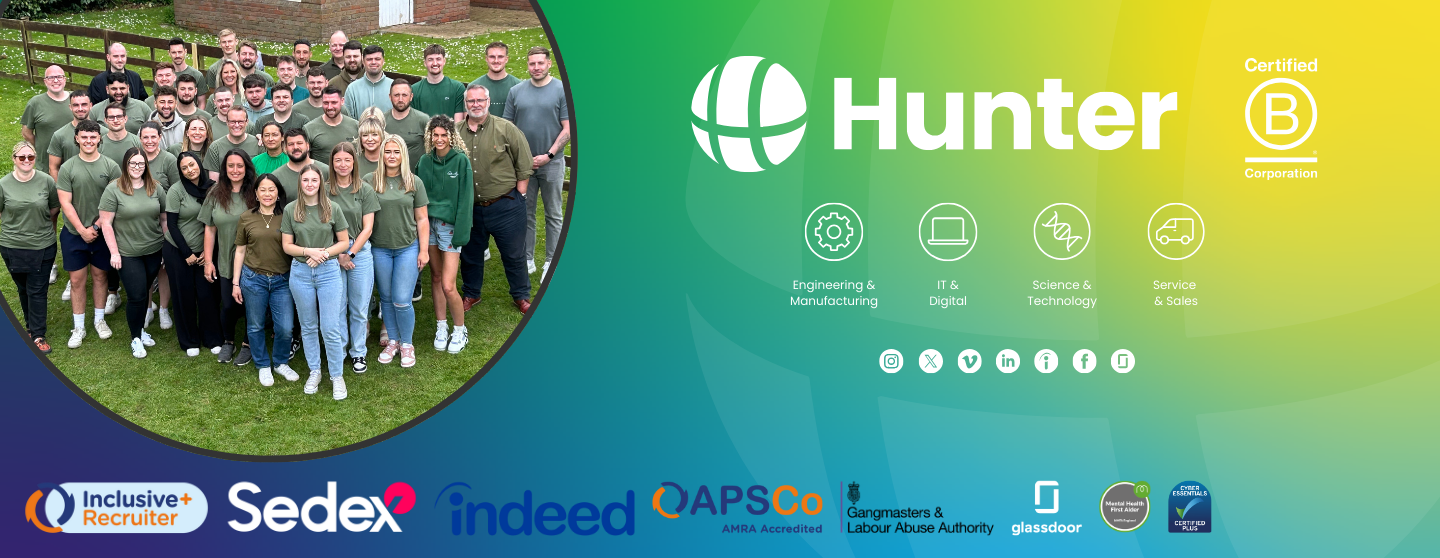

Hunter Selection Limited

Somerset, United Kingdom
September 2024
Employment placement & HR
Service with Minor Environmental Footprint
United Kingdom
We are an employee-owned, specialist recruitment consultancy founded in 2004, who have grown organically through the strength of our leadership team and valued employees. We cover the UK from four regional offices with four core divisions; Engineering & Manufacturing, IT & Digital, Science & Technology and Service & Sales. Our foundation is built upon being an exceptional business operating within the recruitment market, serving all stakeholders with the highest integrity and excellence. We are committed to conducting business with a clear purpose, ensuring that our actions are mindful of environmental sustainability and positive social impact. We build strong relationships based on trust and honesty with the professionals we work with during their job search and seek to find the perfect employer to match their requirements. We know each person has unique skills, attributes, preferences and motivations which can only be understood through interview.
Overall B Impact Score
Governance 20.6
Governance evaluates a company's overall mission, engagement around its social/environmental impact, ethics, and transparency. This section also evaluates the ability of a company to protect their mission and formally consider stakeholders in decision making through their corporate structure (e.g. benefit corporation) or corporate governing documents.
What is this? A company with an Impact Business Model is intentionally designed to create a specific positive outcome for one of its stakeholders - such as workers, community, environment, or customers.
Workers 32.9
Workers evaluates a company’s contributions to its employees’ financial security, health & safety, wellness, career development, and engagement & satisfaction. In addition, this section recognizes business models designed to benefit workers, such as companies that are at least 40% owned by non-executive employees and those that have workforce development programs to support individuals with barriers to employment.
Community 25.2
Community evaluates a company’s engagement with and impact on the communities in which it operates, hires from, and sources from. Topics include diversity, equity & inclusion, economic impact, civic engagement, charitable giving, and supply chain management. In addition, this section recognizes business models that are designed to address specific community-oriented problems, such as poverty alleviation through fair trade sourcing or distribution via microenterprises, producer cooperative models, locally focused economic development, and formal charitable giving commitments.
Environment 11.8
Environment evaluates a company’s overall environmental management practices as well as its impact on the air, climate, water, land, and biodiversity. This includes the direct impact of a company’s operations and, when applicable its supply chain and distribution channels. This section also recognizes companies with environmentally innovative production processes and those that sell products or services that have a positive environmental impact. Some examples might include products and services that create renewable energy, reduce consumption or waste, conserve land or wildlife, provide less toxic alternatives to the market, or educate people about environmental problems.
Customers 2.8
Customers evaluates a company’s stewardship of its customers through the quality of its products and services, ethical marketing, data privacy and security, and feedback channels. In addition, this section recognizes products or services that are designed to address a particular social problem for or through its customers, such as health or educational products, arts & media products, serving underserved customers/clients, and services that improve the social impact of other businesses or organizations.